
Questa recensione può contenere spoiler
Who knew Yetis love sashimi?
If you ever thought, “What would a movie be like if you moved King Kong from a tropical island to a frozen mountain top?”, Snow Monster attempts to answer that question. The movie felt like an old Toho monster movie only with slightly better CGI and monster costumes.In 2045 a van carrying scientists travels through the mountains on the North Pole. I really hope that was a translation error or else there had been some cataclysmic tectonic shifts. Lead scientist Xiao Qin’s instruments showed high magnetic readings and a geothermal hot spot under the van. The scientists believed that high magnetism could result in strange genetic mutations. As if to prove them right, a gigantic hand erupted from the snow causing the van to plummet over a cliff.
Professor Lin asks Xiao’s ex-boyfriend, Ren Yi Fei, to help them find her and he joins the team made up of mostly soldiers. Inside an ancient set of ruins in what looks like a jungle, the team discovers a tunnel filled with centuries old artifacts, skeletons…and deadly prehistoric birds. The men avoid becoming human bird food when they find the exit while being chased by the creepy birds and land outside, in the same location where the lost crew disappeared. The “rescue” crew is confronted with a snow shark (Jaws 5: Just When You Thought It Was Safe to Go Back Skiing), the Yeti, an avalanche, and a tribe of snow elves. Lucky for Ren, the snow elves are friends with the gentle, humorous Yeti. The real danger is a friend who isn’t what he seems to be and his betrayals lead to multiple deaths.
Snow Monster's script was all over the place and most of it did not make sense. I guess they figured if people would watch a movie about a skyscraper tall snow monster, it didn’t matter if the rest was nigh on incomprehensible. There seemed to be a message about leaving endangered people and animals alone, but it was pretty thin. The snow elves’ costumes revealed too much skin for people who lived in eternal winter. Maybe the magnetic field had mutated them in such a way that they were impervious to frostbite and hypothermia. The “science” in this movie was ludicrous and I have no idea what kind of geographical map the writers used, but it wasn’t for this planet. The acting and CGI were serviceable, nothing special. Norman Chui was the only actor I recognized and I’m always happy to see him even for the brief minutes he was on screen.
In order to enjoy this movie on any level you have to have developed a high tolerance for men in monster suits and be able to laugh at the absurdity of giant snow sharks. As is often the case, the humans were the biggest monsters in the movie. The Snow Monster was a sweet fluffy Bumble, as long as you didn’t interrupt him while he was eating his sashimi dinner.
10/7/23
Questa recensione ti è stata utile?
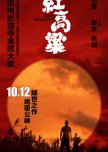
Questa recensione può contenere spoiler
"Sis, daringly keep going ahead"
Red Sorghum was the film that launched Zhang Yi Mou's and Gong Li's careers. For his directorial debut, Zhang's movie won many awards including the Berlin IFF's Golden Bear Award for Best Picture. Saturated in deep colors and textures and accompanied by music that fit every scene perfectly, this 1987 film showed what the world was in for with his mesmerizing style of moviemaking.A radiant 22-year-old Gong Li played Jui/Grandma, a bride being carried along in a palanquin to be married to a 50-year-old man with leprosy. Jiang Wen as Yu/Grandpa was the expert carrier. The men sang a bawdy song of her fate as a young "ugly" bride marrying an old leper. As she bounced up and down in the small litter you could feel her nausea growing. When they reached the wild red sorghum fields a bandit attacks the group, but the men are not so meek as to let him take the bride into the fields. After the wedding she is allowed to return home with a donkey as a wedding gift/payment to her father. Along the way she is once again set upon, this time alone, and Jui runs frantically through the wind driven sorghum chased by her assailant. The masked man turns out to be Yu. He stomps the sorghum down into a verdant bed with all the gentleness of a wild beast. It was difficult to tell whether Jui initially gave her consent, I hope so, because afterwards, she fell in love with Yu. On her return to her legal husband, she's told he was murdered by an unknown killer. The workers prepare to leave but she convinces them to stay in a profit-sharing business. A drunken Yu shows up and she kicks him out. She's kidnapped for ransom by other bandits. After her return, Yu pees into the wine crocks as if marking his territory and carries her off like a sack of potatoes. Instead of ruining the drink, it is now transformed into an exquisite elixir and business booms.
Yu was often portrayed as a primitive male, dirty and brash, and Jui rarely called him on it. Thank goodness, Zhang displayed a more favorable view of women in future films. It was also a credit to Jiang's performance that Yu was considered even somewhat likeable. With the exception of her relationship with Yu, Jui came across as a competent and independent woman.
Jui gives birth to Yu's son and all seems well. It's a magical winery where anything can happen. Life is often lusty and humor filled. Then the movie switches from How I Met Your Mother to The Deer Hunter. The Japanese invade the peaceful village and one of the villagers is flayed. The film ends in a blood bath, as if everyone had gone swimming in a vat of the red sorghum drink under an eclipse. ***
I am a big fan of Zhang Yi Mou's style. His movies are luscious to drink in, the lighting, sets, costumes, and props are all feasts for the eyes and this one was no exception. I would really like to have a set of the drinking pottery, they were beautiful. Few people can capitalize on scenery as he does, color-soaked fields and skies were suitable for framing. A young Gong Li already exuded the power and sensuousness of a grown woman. Her character took over the winery, mothered a child, and called men to battle quite believably. With a running time under 90 minutes, the characters were not well developed, we know little about them except what we see on the screen. Gong Li's and Jiang Wen's exceptional performances helped me to overlook some narrative issues. The change in mood was abrupt and jarring when the shocking violence erupted, I suppose much like in real life when horror and tragedy hit out of the blue.
Red Sorghum showed the fierce tenacity of the rural people in northern China as they faced a variety of adversities and most times were able to create victory and song out of difficult situations. The film was imperfect, but very much worth the effort to experience the premiere stunning collaboration of Zhang Yi Mou and Gong Li, one of the best partnerships in filmdom.
6/30/23
*** A word of warning, there were disturbing scenes. Animals being butchered and skinned were shown up close as well as the human flaying which I could not watch. There were two urination scenes as well. And depending on how you interpret it, a possible rape.
Questa recensione ti è stata utile?

Questa recensione può contenere spoiler
A picture is worth a thousand words, or is it?
If you are not old enough to remember rolls of film, one of the commonly used rolls had 36 shots on it. This film was told in 36 segments based largely on camera shots or the memories from those shots as if labeling a picture or a memory. The film leisurely and gently explored the relevancy between photos and memories and the malleability and impermanence of both.Sai is a film location scout and Oom is the art director. They meet scouting out an abandoned love hotel from the Vietnam War era that Sai has memories of being in her old neighborhood. Sai uses a digital camera, taking many pictures that she will later store and keep. Oom still uses a film camera and often takes pictures of people when they aren't looking even though he refuses to have his picture taken. Though he says he will send them a copy, he rarely does. The two spend a lot of time discovering the nooks and crannies of the possible set and also negotiate with the landlady over room prices for the cast and crew. Oom takes a picture of Gita, the landlady's 12-year-old daughter that later may prove important. Afterwards, Sai and Oom enjoy an evening breeze from the roof and take their picture with her camera in front of the beautiful sky. Soon the "end credits" appear after the 11th shot.
The film jumps into the future 2 years. Sai and Oom have gone their separate ways. When the director she is currently working for discovers the building he built his new script around has been leveled, Sai mentions the other building. She attempts to recover the photos but even after a friend works to restore them, only a few survived and not the one of her and Oom on the rooftop. She returns to the building and talks to the landlady. It turns out Gita died and the landlady would love to have the picture Oom took of her. During the process of trying to find Oom and restore the pictures, she realizes her feelings for him were stronger than she had known. As the film closes in on the 36th segment, Oom looks at the picture of them on the roof faraway on his computer (unknown to her he had copied her images from the shoot long ago), Sai smiles as she remembers the special moment they shared.
36 was shot in an artful way that could also distance the viewer from the characters. Oom is never seen face on, and often shots of other characters were in profile or from behind or even half hidden by architecture. I liked the labeled 36 bits of the story, like looking at a picture album where the photo had been annotated and saved. The OST was also lovely, I especially enjoyed the piano music.
Just as film cameras have mostly transitioned over to digital cameras so are most movies now shot with digital film. The danger of digital film was also addressed in that backups are necessary, because once a disk or other device has been damaged the pictures are likely lost for good. Her friend Kai mentioned how many people brought hard drives to be fixed saying they needed them immediately, but instead never returned for them. A drawerful of memories lay untouched. For one reluctant woman who came to pick hers up, he offered to erase those memories.
Which is more important? To see a bird or to take a picture of it? To experience the person you are with, or only the relative engagement of photos? The argument is made for both the value of the human experience and memory as well as the memories that are brought back by glancing at a photo. For the director whose childhood building was destroyed a picture is all that is left of it and his memories. Ironically, at the end of the movie, Oom who always valued the human experience more is found looking at Sai's picture and reminiscing. Conversely, Sai goes back to the place they shared and the memory floods her mind as she gazes fondly to where they had been together. Memory is a fragile, fading construct of the mind, subject to change. While memories are important, photos help to shore up the time and events. Buildings crumble, people die, digital photos can be erased, photos fade and relationships shatter, 36 touched on the concept of impermanence as well. There comes a time when no one remembers the people or places in the pictures.
While I enjoyed this film, it also failed to emotionally capture me with the relationships involved. The ending was meaningful to the arguments of photo or memory, but it left a hole in the picture I had hoped to find. I was hoping for a 37th epilogue image or a new roll of film to begin. This is a very slow, artful movie, more philosophical than touching. Yet for its shortcomings I did find it engaging. If this genre is of interest to you, it would be well worth trying.
5/23/23
Questa recensione ti è stata utile?
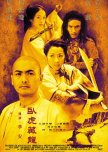
Crouching Tiger, Hidden Dragon
6 persone hanno trovato utile questa recensione
"A faithful heart makes wishes come true"
I first watched this film when it was theatrically released in my country years ago. All I had to go on was a friend's recommendation and zero background in the wuxia genre. To say I walked into the nearly empty theater apprehensive would be an understatement. My fears were for naught. In a matter of minutes, I was completely mesmerized by the cinematography, music, and acting. Having watched my share of fantasy and super hero movies, I had no problem with the flying and light body technique as the characters danced across rooftops or fought high in a bamboo forest. The graceful movements and fighting techniques were like nothing I had ever seen. Crouching Tiger, Hidden Dragon was the gateway into a new world for me. Little did I know that it would set the bar for all films that followed.Though this movie was a wuxia, the heart of the film were the two romances. Yu Shu Lien, the owner of a delivery escort service and Li Mu Bai, a warrior trained at Wudan had fought their feelings for years. Their love was unrequited as Lien had been engaged to Li Mu Bai's friend, but he was killed and the two would not act on their feelings. Now they are reunited as Mu Bai brings her his famous sword, The Green Destiny, and asks her to deliver it to their protector. His journey toward self-enlightenment has brought him to her and he wishes to leave the bloodshed behind them. The 400- year-old sword is too much temptation for Jen, a young woman engaged to be married but secretly trained by the devious Jade Fox. The incognito Jade Fox had poisoned Mu Bai's master years before for his refusal to teach her the secrets of Wudan. Lien is aware who stole the sword and works to return it without bringing any dishonor to the families involved. The middle of the film focuses on Jen and her previous love affair with Lo Xiao Hu/Dark Cloud, a charismatic desert bandit, and in the present when she takes the sword a second time to find her way as a wandering warrior. Mu Bai and Lien know she needs someone righteous to train her before she becomes a poisonous dragon. The treacherous Jade Fox has only vengeance on her mind for Jen and Mu Bai. By the end of the film the characters will collide in a deadly conclusion.
On a recent re-watch, I could see all of the classic wuxia elements from the over 200 martial arts movies I have watched since that long ago day in the theater. Ang Lee used those elements but blew them up into a grand epic, showcasing a wide variety of stunning scenery taking the genre where it had not been before. Characters traveled through the mountains, desert, verdant valleys, and lush bamboo forests. The inn and outdoor café sets ubiquitous in so many old kung fu films made their appearance in grand style this time. The busy city streets didn't feel like a small set, but substantial with plenty of extras to add an additional layer of realism. Ang Lee made full use of the sets and scenery to bring about an energetic and beautiful atmosphere for the story to be told in. Unlike so many martial arts movies prior to CTHD the characters in this film were more important than the fighting. He not only succeeded in making a gorgeous framework for the story but also in developing characters we could feel empathy with as they struggled with their deepest feelings. They had depth and emotional weight to them instead of the thinly drawn characters of old. By paying attention to the smallest details and insisting on a quality presentation, Ang Lee set the bar higher for those who would follow him.
Michelle Yeoh was a revelation to me, and I will always be thankful for this film introducing me to her. She had been in the business for over 15 years at this point honing her craft and risking life and limb at times to do so. Though her fighting technique was fearless, quick, and agile, it was her expressive face revealing longing, fierceness, and tenderness that quickly drew me in and made me a life-long fan. Her portrayal of the mature and wise Yu Shu Lien was perfect. Chow Yun Fat as the spiritual warrior Li Mu Bai, showed how he was torn between his love for Lien, his desire for enlightenment, and his need to avenge his teacher. His calm demeanor was in stark contrast to Jen's firebrand personality always teetering on being out of control. Zhang Zi Yi in only her second film held her own with the veteran actors. As Jen she conveyed naivete, passion, and anger fluidly. Chang Chen as the ardent Dark Cloud resonated the wildness of the desert and his fervent love for Jen. Again, there was the contrast of Jen and Lo's fiery passion in comparison to Mu Bai and Lien's controlled, repressed love. Rounding out the stellar cast was Cheng Pei Pei as Jade Fox. I have gone on to watch her earlier movies where she had been the young female warrior who faced insurmountable odds, paving the way for other actresses. I'm so pleased they used her in this movie as the vengeful villain and gave the kung fu veteran a chance to shine.
Lien and Jen both sought freedom in their own way and both were bound by duty. Jen loathed being forced to marry wishing only to be free and Lien greatly desired to be with Mu Bai, but was prevented by a rigid sense of honor. The two couples were the inverse of each other emotionally and would gradually become more like the other whether a crouching tiger, biding its time or a hidden dragon of emotions. Lo and Jen, embodied the recklessness of youth with no regard for tomorrow. Lien and Mu Bai sought to guide them to more thoughtful actions. For restrained Lien and Mu Bai, they had reached the point where they were finally able to break through their control to unleash their feelings and unspoken words. True love trumped spiritual enlightenment as what was important became revealed in one last breath.
The only quibble I have with this magnificent film is with the long flashback interlude showing Jen and Lo's love affair. It was similar to The Taming of the Shrew and feels dated in the telling.
Yuen Woo Ping masterfully matched the fight choreography to the mood of the film. The actors did much of the fighting, check out all the face time during the battles. Instead of CGI, the floating and leaping, even in the bamboo forest-truly a thing of beauty, was accomplished by wire work. The fights were more elegant than brutal and more visually captivating than realistic. Aside from the bamboo forest fight, the fight between Lien and Jen was spellbinding. The experienced Lien used a variety of weapons as she sought to subdue the thief of the Green Destiny in a memorable fight choreography.
After my recent re-watch I found that Crouching Tiger, Hidden Dragon has stood the test of time. Though I have searched for its equal or better through the years I have yet to find a martial arts film to top this one. Only Hero's stunning aesthetic came close. Compelling characters, wonderfully acted, enchanting cinematography, a haunting score, and balletic fight scenes have made this the measuring stick for all other films. It is rare for a film to touch me deeply emotionally and this one has for over two decades. I need to remember to thank my friend again for encouraging me to visit this world of wonder.
3/31/23
Questa recensione ti è stata utile?
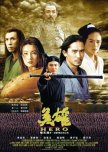
Questa recensione può contenere spoiler
All is fair in love and war...
For those who love wuxia or Zhang Yi Mou's films, Hero will weave around you, wrapping you in its hypnotic effects of color, music, scenery, and skilled performances. The film is a poetic examination of the different facets of being a hero and the sacrifices required. As a fan of both wuxia and Zhang Yi Mou I found this film breathtakingly beautiful and emotionally heartbreaking.It is helpful to understand on the first watch of Hero that the story is not told in chronological order or from a single viewpoint. Each viewpoint and version of the story has a particular color hue. When the warrior Nameless is brought before the Qin emperor, gray and black dominate the color scheme. Nameless has killed the three most infamous and dangerous assassins in the realm granting him unprecedented access to the emperor, coming within 10 paces of him with only several rows of candles between them. The emperor asks Nameless to explain how he came to possess the weapons when even 3000 soldiers could not acquire them.
Nameless (Jet Li) tells the emperor a story of how he defeated Sky (Donnie Yen) and his silver spear in the rain accompanied by an old blind man playing the guqin. Every time I watch this movie it is a treat to see Jet Li and Donnie Yen fighting in the rain with water dripping from the rooftops. Next, in a world gone crimson, Nameless explains how he defeated the warriors and lovers Snow (Maggie Cheung) and Broken Sword (Tony Leung). Broken Sword believes that calligraphy and sword fighting are intertwined. He and Snow are the masters in a calligraphy school drenched in red but have a rift driven between them. This vermillion school is the home of primal emotions-jealousy, hate, lust, and revenge. Nameless wants a banner with the unique and 20th version of the word "sword". This memory has a sequence with an extraordinary fight between Snow and Moon (Zhang Zi Yi). In a spiraling storm of golden leaves the two women swirl and parry until blood is drawn and the leaves echo the color of life and death.
The emperor doesn't believe Nameless and gives his version of events now told in blue. The characters are calm, clear thinking and accepting instead of being ruled by their passions. Instead of Nameless ending up with the swords because of vengeance, this time the lovers willingly hand over their swords in order for the skilled Nameless to kill the emperor. After Snow sacrifices herself Nameless and Broken Sword have a balletic battle over a tranquil cerulean lake.
Finally, the truth is told in white as death hovers ever near for the characters and the genuineness of their motives is revealed. The emperor's memories of Snow and Broken Sword attacking him three years ago are in green with floating green curtains hanging from the throne room ceiling. In this emerald world Broken Sword had a moment of clarity and that clarity distanced Snow from him.
Zhang Yi Mou's lush and color saturated frames were romantic and stunningly spectacular. Every version of the events was filtered through the chosen color-lighting, wardrobe, and sets. He is a director who always knows how to get the most out of nature's scenery whether in the wind blown desert or a verdant hillside. Tan Dun's score was splendidly lovely and mournful.
This film had a dream cast. Jet Li's reserved acting was perfect for the Nameless and committed warrior. Maggie Cheung and Tony Leung have never looked more beautiful. Snow and Broken Sword had a tender yearning for each other tragically tethered to her burning desire for revenge. They were truly the emotional heart of the film. Neither the lovers nor their swords could ever be parted. Their final scene was emotionally shattering. Zhang Zi Yi played Broken Sword's servant, Moon. Thinly drawn, she filled it out as much as she could. Donnie Yen was only briefly featured and brought the martial arts credibility to go along with Li's. Chen Dao Ming gave the right amount of balance, maybe more humanity than he deserved to the tyrant emperor.
Despite being a wuxia, the fights were not the main thrust of the story, even though they were well choreographed and shot. For those not familiar with the genre, the fights often relied on wire work. Though most of the actors were quite graceful as they danced and twirled in the air, there were a few gaps. The choreography tended to err on the side of the visual instead of the realistic which made for imaginative sword work. Jet Li moving through the rain drops is still one of my favorite movie images. The large Qin army raining down impossibly numerous arrows on the calligraphy school with two characters countering them conveyed the dire situation of the heroes and the high stakes.
The only thing that kept this film from being perfect for me was the ending. The emperor's adage that the brutal destruction of his enemies and annexation of their lands was for the greater good and the hero's acceptance of this was disturbing. I thought it was ironic that the old calligraphy master said, "Qin arrows can never annihilate our written words." In reality, the emperor did just that by massive book burnings and burying alive over 400 scholars who disagreed with him. I do agree with Broken Sword that the goal is to be rid of the desire to kill and the need for the sword and to live in peace with one another. Because this is not my country and history, I do not have an educated view on this emperor, only a limited personal opinion. Whether desiring to kill the emperor to prevent further war or letting him live to prevent further war, the heroes were willing to sacrifice all for their beliefs.
Despite the ending, I loved this film. The haunting score, the lush colors, fanciful fights, and sorrowful love story pull me in every time. In large part due to the stellar cast and Zhang Yi Mou's exquisite directing style, I have found few wuxias better than this one.
3/27/23
Questa recensione ti è stata utile?

Questa recensione può contenere spoiler
We are the stories we tell
Taipei Exchanges is a gently introspective slice of life about two sisters who ponder what stories hold value when they set up a barter system in their coffee shop. This film is not for everyone. The changes in the sisters and their customers are small and quiet and will go unnoticed if you don't pay attention from your table in the corner of their café. If coffee and discovering the meaning behind the stories people tell about their lives and belongings interest you, pull up a chair, order a coffee and cookie and see where the film and memory takes you.If someone gave you the money to do one, which would it be? Use the money to study or travel?
Doris is practical and has always wanted to open an elegant coffee café. When she finally has the opportunity fate turns her dream into the quirkiest shop in Taipei. Without giving too much away, on her opening day she ends up with a plethora of calla lilies and invites people to bring something to exchange for them. Afterwards with their shop full of junk, her sister has the idea that customers can bring something to exchange for whatever is in the shop thinking it will create more foot traffic and people will stay longer and drink and eat more. Doris reluctantly agrees hoping it will lead to financial freedom for her. Josie wants a car for herself and a set of bone china for her mother.
Along the way, the sisters find that what things are worth is a deeply personal belief. What is the story behind it? Love letters, songs, a mirror ball, stuffed alligator, and even cleaning out the backyard drain are up for exchange. As Doris hears the stories of the places people have traveled, a shift begins to take place in her.
What do you treasure the most?
Doris makes a decision that seems radical and perhaps it's radical self-love to realize that what we value may change over time. The sisters believe that whatever you are looking for someone has and it's only a matter of time before the need to have and the need to release meet each other. Often our lives can be changed by one small incident and decision, in Doris' case a fender bender with a small truck full of calla lilies led to small change after small change leading to a larger change in her life and the lives of those around her.
Taipei Exchanges is beautifully and thoughtfully shot, within the store and around Taipei. The OST is soothing and won't jar you out of the existential questions that arise over what we value, why, and what is our inner value to ourselves and others. For the most part the acting is natural and the sisters have good chemistry in the way that sisters love each other still bicker. Some of the basic business issues are touched upon when starting up a business, but don't weigh the story down. People off the street answer two of the questions above and though some may sound more scripted, others are quite relatable.
Everyday we tell ourselves stories about our failures, hopes, dreams, and even the lies about ourselves that help us sleep at night. We cherish the stories behind an object or even despise an object because of the emotional baggage that it carries. Is a song worth a book? A Barbie dollhouse worth a mirror ball? What happens when people exchange goals and dreams? This film will not turn your world upside down, but it may cause you to take a moment to look around and even within yourself and wonder what has value and why?
If you had the choice between money and calla lilies, which would you take?
2/24/23
Questa recensione ti è stata utile?
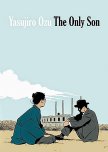
Questa recensione può contenere spoiler
"Tragedy in life starts with the bondage of parent and child"
The Only Son is considered director Ozu's first talkie. Even with the spoken dialogue he still leaves space and silence to contemplate his characters' actions and conflicts. Classically Ozu, he studies the relationship between a parent and grown child. Instead of the wealthier families of some of his later films, this widow and child are living in poverty. In this film he also has the son and mother begin to define what success means to them and the emotional cost of failure.The story begins in 1923 in rural Japan. The mother works at a silk factory doing rigorous physical labor. Her son wants to continue his education, an education she can't afford. His teacher who is preparing to leave for Tokyo stops by the house congratulating the surprised mother on allowing him to go to high school as the son had told him she'd agreed to it. Ultimately, she decides to make whatever sacrifices she must for him to have a better chance in life. The last thing he tells her is that he will become a great man.
The story jumps ahead to 1935 with the mother missing her son and deciding to go visit him in Tokyo. Mother and son have not seen each other in years and seem happy to be together again. The son has a surprise for his mother, he is married and has an infant son. He also is working as a night school geometry teacher and living in a small house in view of the garbage incinerator smokestacks. This brings about the critical theme of the film. The son is ashamed of his job and lifestyle after the sacrifices his mother made for him. The mother is disappointed that he seems to have given up on attaining a better life. Much like in Tokyo Chorus, 1930's Tokyo is portrayed as the great dream destroyer.
Later in the film, the son helps a neighbor in such a way, that the mother beams at him with pride. He may not have become the great man she'd hoped for, but he had become a good man with a good wife. For her, this is enough to ease her worries about him. This is success in her eyes.
Ozu uses many of the techniques and compositions that will define his later work. Filming from the mat, even when in a car is in place. His ubiquitous teapot takes center stage in many scenes. As always, every prop, every angle is thoughtfully and creatively brought together to be aesthetically pleasing and to help tell the story. At one point after an emotional confrontation between mother and son, with his wife sobbing in the background, Ozu lingers on a shot of a painting on a wall near a window and holds that shot for almost a minute, as night turns to day. Almost as if the raw emotions of his characters needed time to be processed by them and us.
Tokyo was the great soul crusher, and during this time the depression had finally caught up with Japan, making work hard to come by. The son's teacher had to become a cook in a small restaurant. The teacher was played by Ozu regular Ryu Chishu, someone you could always count on to bring a character quietly to life. Lida Choko conveyed the mother longing to see her son, happy to be in his presence, and also discouraged at his negative resolution perfectly. Himori Shinichi felt like the weaker acting link. He spent much of his time smiling and gave no inkling of his character's desperate emotions for most of the film.
Interestingly Ozu had the mother and son go to the movies and watch a popular German talkie. Rather lengthy clips of the film were shown. The son's house also had some posters from German movies. Though imminently Japanese, the great director was also open to influence from foreign films.
The German film was one of the only outings we see that the son took his mother on as he spent most of their money trying to show her Tokyo. Unlike so many of the ungrateful male characters in older movies, ones women sacrificed everything for, this son, despite the financial hardship, wants his mother to have a special time. He wants to make her sacrifice worthwhile and up until then had felt he'd completely failed. Even with hardships, disappointments, and setbacks, the film had a warmth and gentle humanity to it. Life wasn't easy, but the film showed the value of family and friendship, of looking out for each other.
As so often happens in Ozu's films, the parent ends up alone. The mother may have been alone, but after seeing the man her son had become could find acceptance in her trials and life. The son, reinvigorated from his mother's belief in him, sat aside his nihilistic acceptance to once again hope. This quiet film was realistic and engaging on many levels. Easily one of my favorite Ozu films.
10/24/22
Questa recensione ti è stata utile?
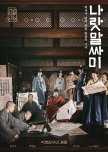
Questa recensione può contenere spoiler
The world is not ruined by the truth
The King's Letters gave a fascinating glimpse into the creation of Hangul, the Korean alphabet. It was set in 1442 with King Sejong the Great determined to do something for his legacy as the sands were quickly running through the hourglass of his life and reign.The Joseon court was largely ruled by ministers and scholars schooled in Confucianism and Chinese writing. They were not at all interested in developing easily learned phonetic letters for their language. Sejong wanted all of his people to learn to read and write which would have meant more competition and a threat to their power and positions.
King Sejong was not to be deterred. An envoy of Japanese monks arrived demanding the Tripitaka, the oldest collection of Buddhist scriptures written in Hanja on over 80,000 wooden blocks. A series of dots connected him, with some help from the Queen, to the Joseon Buddhist monk in charge of the Tripitaka. Sejong discovered the monks could chant, read and write in Sanskrit which was based on phonetic letters. His Eureka moment occurred after years of failed attempts to create an easy and useable alphabet. Promising the monks he would build a temple in the capitol if they would help him with the alphabet, an uneasy alliance was formed.
Much of the film covered the monks and king working through their language and breaking it down into a total of 28 consonants and vowels. Instead of memorizing thousands of characters, what they were developing would make it much easier to be literate. Sejong wanted the letters to be elegant and concise like geometry using only lines, dots, and “facets”. The major conflict of the story was keeping what they were doing from the Confucian court. Due to conflicts with the Buddhists during the Goryeo Dynasty, there were hard feelings on both sides. Most of the tension, however, dealt with the ailing king fearing he wouldn’t live long enough to not only create the letters but also to spread their use so that they would be protected and take root.
Spoiler alert! Of course, they succeeded as we all know. Sejong did end up giving the Confucians credit to try and gain their support. It took time for the “vulgar” or “women’s” script to be accepted. Thankfully, women and fiction writers used it as well as Buddhist monks which kept it alive until it took hold. In 1849, it was adopted as Korea’s national writing system. Even the Japanese during their occupation who outlawed it, couldn’t kill it.
The King’s Letters did tend to slow down and become repetitive in the latter part. I am enough of a documentary geek that this felt like an enjoyable one only dressed up and with excellent acting. Song Kang Ho (King Sejong) had great chemistry with both Park Hae Il (Monk Shin Mi) and the late Jeon Mi Seon (Queen So Hun). The cinematography, sets, and costumes were all lovely.
King Sejong was playing the long game, he wanted an educated people who would only make the country stronger and more enduring. His vision didn’t come to bear overnight or even in his lifetime, but he planted a seed that did take hold, blossomed, and bore fruit. Is still bearing fruit. A legacy of knowledge which can break down class lines and open communication is not such a bad legacy after all.
10/10/22
Questa recensione ti è stata utile?
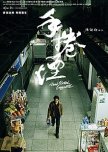
Hand Rolled Cigarette
6 persone hanno trovato utile questa recensione
Questa recensione può contenere spoiler
Let's Start Over!
Hand Rolled Cigarette is an old school violent crime drama that almost makes itself into something a little more special, but just misses the mark. Even in the face of debt and despair, two criminal misfits keep marching forward, hoping for that chance to start over. Along the way, the disparate strangers find themselves counting on each other to survive.The film begins with the turnover of Hong Kong and the servicemen previously in the Queen's army now being left behind. Chiu bolsters his military brothers by saying it's their chance to start over. Years later, some have made it better than others. Chiu and another military brother had borrowed heavily and invested in the stock market only to watch it crash and lose everything. Deeply in debt, Chiu hustles on the triad fringe to try and stay afloat, now shunned by his military brethren. His next big deal is as a middle man for a guy selling illegal turtles and a local kingpin, a deal that goes south landing Chiu in trouble.
Mani is an Eastern Asian immigrant, reluctantly in the drug business with his brother/cousin Kapil. Mani also takes care of his younger brother who is still in school. Due to racism, the family runs into financial and social walls everywhere. Kapil wants to take greater risks to make bigger scores which leads to deadly events after he makes a major mistake. They find out that drug dealers keep track of their product and are neither kind nor forgiving, especially with those who steal from them.
Desperately fleeing a vicious gang, Mani ducks into Chiu's apartment and hides. Chiu isn't thrilled when he finds the interloper but against his better judgement allows the young man to continue to hide there as long as he doesn't touch anything. They don't have many interactions but Chiu does help when Mani's younger brother gets into a fight at school.
Eventually, they decide to sell the stolen drugs to try and pay off everyone they owe. All of which leads to a violent no holds barred final confrontation.
Hand Rolled Cigarette is more of a character study at times than crime drama. Chiu keeps a video of his military days when he respected himself and what he did. He suffers enormous guilt over his past actions leading him to act self-destructively at times. Mani wants a better life for his younger brother, including a good education, even if it means sacrificing his own. The two small time criminals both are good men at heart forced into grim decisions by their crumbling circumstances. Recognizing that in each other they do make a bond.
Be advised there are scenes of torture and brutal murders. Mani is repeatedly called by a racist name. They don't shy away from expressing the racism underlying the society. It can be a difficult film to watch.
The cinematography while showing greater Hong Kong at night, also shows the suffocating world the men live in and all the deadly and dangerous things that can happen in small places.
This film is dark as the two men try to navigate the dangerous world of the triads, forming an unlikely bond. My only real caveat is that their friendship felt underdeveloped to me. I would have preferred a little more buildup of their relationship, events that might have shown the evolution of their devotion more. Or maybe they were just two guys that were hunkered down in the same foxhole with only each other to rely on as the bullets and bombs whizzed by. Either way it was an entertaining Hong Kong crime film, but with a little more relationship development I would have rated it higher.
9/15/22
Questa recensione ti è stata utile?

Questa recensione può contenere spoiler
"Men will remain clueless unless we're more open about these things"
Our Rainy Days tackles a topic not only men are uncomfortable with, but many women as well---Menstruation. That monthly visitor most of the 51% of the population will deal with in some form or fashion in their lives is all part of being human for the female part of the species. Too often not medically studied or properly funded, because it's a "female problem", women have often suffered in silence. Period shame and period shaming will only end when people realize it is normal and healthy. This special takes a look at a photographer and a model both having to handle their symptoms on the job and in public.Kojima Hikari is a photographer on her fist big shoot and it's for a men's magazine. Aoi is a small time idol who wants to transition to acting and is following the path of a bikini shoot to get noticed. Hikari awoke to her alarm warning her it was PMS time, also that it was her first big shoot and to not screw it up. The day starts out raining as they travel by bus to the beach. Aoi's visitor pops in during the shoot causing problems that the men have no idea how to deal with.
This special discussed how not every woman can wear a tampon, much to the crew's chagrin. It also showed that despite their pain and other symptoms the two women were able to come up with creative solutions and do their work. As Hikari says, "Some crisis are opportunities, others leave you stuck." Menstruation is normal but it can also be challenging.
Our Rainy Days wasn't a be all end all in the discussion, but it did one thing that needs to happen more often-communication. By sharing our stories with each other we normalize something that is normal. What works for one may or may not work for another. There are lots of period paraphernalia options and medical ones for those who need it. Don't be afraid to talk with a medical professional or trusted female friend or family member. Most of all, be proud of being a woman and all that entails. And if you are a man, man up and learn about what the women in your life go through each lunar cycle and practice your empathy muscle. Sarcasm and shaming are no longer acceptable. And girls/women we have nothing to feel ashamed of, it's okay to be okay with our periods. So ends The Butterfly PSA addendum to this review. ^^
9/6/22
Questa recensione ti è stata utile?
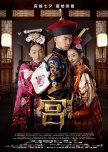
Questa recensione può contenere spoiler
"If you keep on believing, the dream that you dream will come true." -Cinderella
Two of my favorite Chinese actresses, Zhou Dong Yu and Zanilia Zhao starred in The Palace. More Cinderella fairytale than actual historical tale but entertaining nonetheless.Chen Xiang and Liu Li came to the palace as 13 year-old girls to serve as maids and became fast friends. Chen Xiang lost her earring in an abandoned garden on her first day, think Chekov's gun or Cinderella's slipper. Quickly fast forwarded 7 years, the two turned into Dong Yu and Zanilia, now twenty-year-olds still prone to giggling and screaming. Each had their dreams of winding up with a handsome prince no matter how remote the possibility. But in fairytales even remote possibilities can become reality. Chen Xiang met the 13th Prince once again in the abandoned garden only this time she wore a scarf over her face as they had a chaste memorable time. Liu Li, uh, banged into the nefarious 9th Prince. Before you could say mistaken identity the 13th Prince and Liu Li were to be married. Chen Xiang found herself becoming her friend's servant while Liu Li turned into a wicked stepsister to keep their secret.
Chen Xiang was the childlike, virginal, self-sacrificing heroine complete with a repertoire of giggles and screams. Liu Li with her lusty desires for sex and power went from fast friend to Fast Times at Ridgemont High turning evil at the drop of her clothes. There was never much of a reason for Chen Xiang to keep her secret other than to be the traditional martyr and long suffering heroine. I wasn't crazy about the portrayal of the young women. In this fairytale all women were considered pretty much alike and were designed to please men in order to have any security, which given the times probably wasn't too far off the mark. There was no shortage of examples of what happened to maids or concubines who failed to please. The fact that the 13th Prince couldn't tell them apart reinforced their interchangeable nature.
The costumes and sets were luxurious, with mood fitting lighting and exquisite cinematography. Every shot was beautifully framed. No pumpkin coach or mice, but there was a stunning CGI dragon and lots of luminescent butterflies. The actors were cornered into stereotypical roles but still managed to bring their characters to life.
Once the movie got past the giggling, so much giggling, it became more enjoyable for me, even when it dipped into melodrama and political intrigue. Being a fairytale all that mattered was the romance and Chen Xiang winning the Prince's heart through her kind and selfless acts. But it was a Chinese fairytale so that meant being able to avoid being beheaded, beaten to death or exiled in the process.
9/5/22
Questa recensione ti è stata utile?
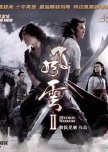
Questa recensione può contenere spoiler
Hard to Be Righteous, but Easy to Be Evil...
Ekin Cheng and Aaron Kwok returned as the characters they made famous a decade earlier in Storm Riders. Wind and Cloud were an unbeatable team who kept the bad guys at bay until The Evil Lord Godless and his son Heartless with their Japanese army kidnapped the emperor and searched for the treasure within the Dragon Tomb.I enjoyed The Storm Riders (1998). It was cheesy and the CGI was rudimentary, but the story was coherent and the action fun. The Storm Warriors (2009) took itself way too seriously and replaced storyline with endless slow-mo action scenes. Dialogue and character development were kept to a bare minimum. If you haven't watched the first one it may not matter because the atmospheric boys were hard to distinguish with the poor writing for them.
Simon Yam as The Evil Lord Godless seemed invincible and pretty soon it was just Wind and Cloud left to fight him and save China. They didn't have long for a super charged training montage so that they could take their revenge on the over-compensating dressed warlord. Wind went to Lord Wicked and took the, well, wicked route via an evil mud bath while Cloud went the righteous way and was trained by the wounded Nameless at the same time. Before you could say Buckets O' Blood, super slow motion, comic book style fighting with plenty of dismemberments and red goo flying through the air, took place and Cloud had to try and bring Wind back to the good side.
The story was frightfully thin and convoluted. Shu Qi knew what she was doing when she passed on the sequel and left her role to Tiffany Tang. The movie could have easily been 20 minutes shorter if the fights had been shot at regular speed. By the last twenty minutes I didn't really care about the consequences or who lived or died I just wanted it to end. A few of the fights were beautifully shot and the CGI was better than the first movie, but they dragged on at a glacial speed. When CGI replaces actual story and character development I lose interest quickly. During one of the overcooked fight scenes I really thought one of them might yell out, "Kamehameha!"
The Storm Warriors had a cast I was very excited about but they were criminally underused. Ekin and Aaron had grown as actors since the time Storm Riders was filmed but it was irrelevant as most of the time they were filming fight scenes in overly dramatic slow motion. They certainly didn't have to worry about learning many lines. Simon Yam was at least properly menacing as an undefeatable warlord, a nifty trick given how little time he had on screen. Nicholas Tse as Heartless had little to do except look pretty and scowl. Charlene Choi as Dream had little to do but look pretty and worried for her few scenes. Even for comic book characters the lot of them were mostly lifeless. Ultimately, I didn't care about any of them.
The OST was nice if melodramatic at times. As with many of the movies in this genre, the costume department used a lot of leather, gold lame, and metal looking armor. There was no shortage of wind machines as Ekin and Aaron had their long layered mom hairdos seemingly always flowing in the wind.
If you enjoyed The Storm Riders, don't get your hopes too high for this sequel. Several storylines were left dangling, completely forgotten. Maybe I am truly the Heartless one because I actually laughed during the last scene which I'm sure was so supposed to be emotional but came across as absurd to me. As one of my favorite TV baking judges would say, The Storm Warriors was style over substance. It might have looked good, but it didn't taste very well going down.
8/24/22
Questa recensione ti è stata utile?
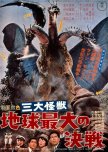
Ghidorah, the Three-Headed Monster
6 persone hanno trovato utile questa recensione
Questa recensione può contenere spoiler
Dream Team vs Ghidorah the Three-Headed Monster!
Earth is imperiled when a meteor drops a world ending monster in her lap. King Ghidorah threatens all life on Earth and only a reluctant team of Kaiju can stop him led by Godzilla.This movie is a fun monster ride. The writers threw everything at the screen in order to entertain the audience-a foreign princess with a death squad after her who is taken over by an alien presence (from Mars, Venus, or Jupiter depending on the version you watch), a police officer trying to protect her, an intrepid and annoying female reporter, various scientists, and a doctor who will look familiar to fans of Kurosawa movies.
The alien inhabited princess tries to warn the earthlings that danger in the form of the three-headed fire breathing Ghidorah is coming their way and that Rodan is waking up from inside a volcano. Everyone thinks she's a crackpot. Shimura Takashi as the doctor runs a number of tests on her to see what's going on inside her head even as the death squad appears with guns blazing. The Cosmos return to help out and warn that Rodan and Godzilla are headed back to town. Finally, people decided it's time to start running and screaming as the three giants make their presence known.
Ghidorah rains down destruction upon the people in town while Rodan and Godzilla fight each other in the countryside. Mothra, in her caterpillar form, arrives to try and convince them to fight together against a common foe to save humanity. And their response was, "what's humanity ever done for us?" When Ghidorah attacks the squabbling monsters, the story finally picks up and it is a royal rumble for the ages.
Ghidorah the Three-Headed Monster feels like a movie aimed more at children than adults, but there is enough for adults to enjoy, too. Even though the movie spends too much time leading up to the monster fights, the humans and human-alien were more entertaining than in Godzilla movies from this era. Ghidorah was nearly always a worthy opponent for Big G and it was fun to watch the Dream Team of Kaiju take him on. If you enjoy the Showa era movies, this is definitely not one to miss.
Questa recensione ti è stata utile?
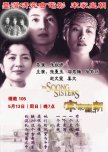
Michelle Yeoh’s sister married a wealthy banker. Maggie Cheung’s sister married the revolutionary and ultimately leader of the Nationalist party, Sun Yat Sen. Later she was an integral part of the communist party. Vivian Wu’s sister married Chiang Kai Shek who would take over the Nationalist party after Sun’s death and later she would become the First Lady of Taiwan. And that’s about the extent of my knowledge on this subject.
I take all historical movies with a grain of salt, everyone has their own agenda or message they want to get across. I’m even more skeptical when governmental censoring is always lurking in the background. Someone else with more knowledge about Chinese history will have to judge the accuracy of the historical aspects of the story.
Purely as a work of art, The Soong Sisters was lovely to look at. The cinematography, sets, and costumes were lush. The OST gave the right amount of mood to the scenes that took place across several decades. Plus, I'm always happy when a film is F rated, Mabel Cheung was the director.
The actresses all gave strong performances. Wu Hsing Guo was quite charismatic as the mercurial leader, Chiang Kai Shek as well.
Where the movie faltered for me was that the sisters were rather thinly drawn. Ostensibly a movie about three powerful women, two who were the wealthiest in China at one point, the other a communist icon, should have fully developed the complex characters and given these talented actresses something to sink their teeth into.
Maggie’s Soong Ching Ling was the only sister who came across as three dimensional as she worked with the communist party to maintain the integrity of her husband’s legacy. Michelle’s Soon Ai Ling had the smallest role of the sisters. The tag line indicated she loved money, but there wasn’t much evidence of that. Vivian’s Soong Mai Ling seemed more like an infatuated school girl for most of the movie, finally developing a backbone in the last quarter of the story.
It felt like the three women were ignominiously dropped from era to era and place to place. Much of the time I wasn’t sure where or when the story was taking place. Their father’s story would have been fascinating to see made into a movie, but by devoting so much time to him and the women as children we missed out on the real meat of the story. His presence did loom over them as he had wanted a new China. Was his dream all that motivated them? What were they thinking? What kind of relationships did they have with these powerful men? Two of the them never had children, did that cause any conflict in their relationships? Extreme hardships were glossed over. The film did touch on the political conflicts between Chiang Kai Shek and Soong Ching Ling, he was bitterly opposed to the communist party and she had given up on the Nationalist Party when he took over and ordered purges. I can't even imagine how strained those family dinners were when they got together.
With all the wealth, power, egos, and rivalries, there should have been more depth to the characters and story. The Soong Sisters was a beautiful pool of water to look at, unfortunately these still waters didn’t run very deep.
Questa recensione ti è stata utile?
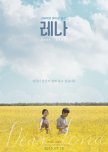
Lena is a descendent of Koreans who were forced to work for the Japanese mining coal in Sakhalin and then later trapped there after WWII. Their story would make an interesting film in and off itself as they fought for citizenship and many fought to go back to South Korea. They became second class citizens in Russia and those who made it home were less than in South Korea as well. Lena wants to bury her parents' ashes in South Korea and becomes a mail order bride to make the trip. This aspect is barely touched on and again, would have given more depth to the story to explore that process.
The male lead is a tea farmer in a remote area which lends itself to some lovely cinematography. He tries very hard to make Lena feel welcome and give her anything she needs. Lena in turn tries to help with different chores to show that she is invested in the relationship. She calls him ahjussi throughout the movie which seems to make their relationship an even further oddity. As she walks to the fields she makes friends with a photographer who is traveling through and begins learning to take photographs. Both the film's cinematography and her photos play a large role. Lena tends to be quiet, walking and taking pictures as she has much on her mind. I wish we'd been more privy to what was weighing so heavily on her.
The last thirty minutes or so give the movie the emotional thrust it sorely needed. While this was a beautiful, quiet movie, it could have been more meaningful if only the director had stirred the calm surface with the emotions running beneath.
Questa recensione ti è stata utile?

 53
53 182
182 10
10






















